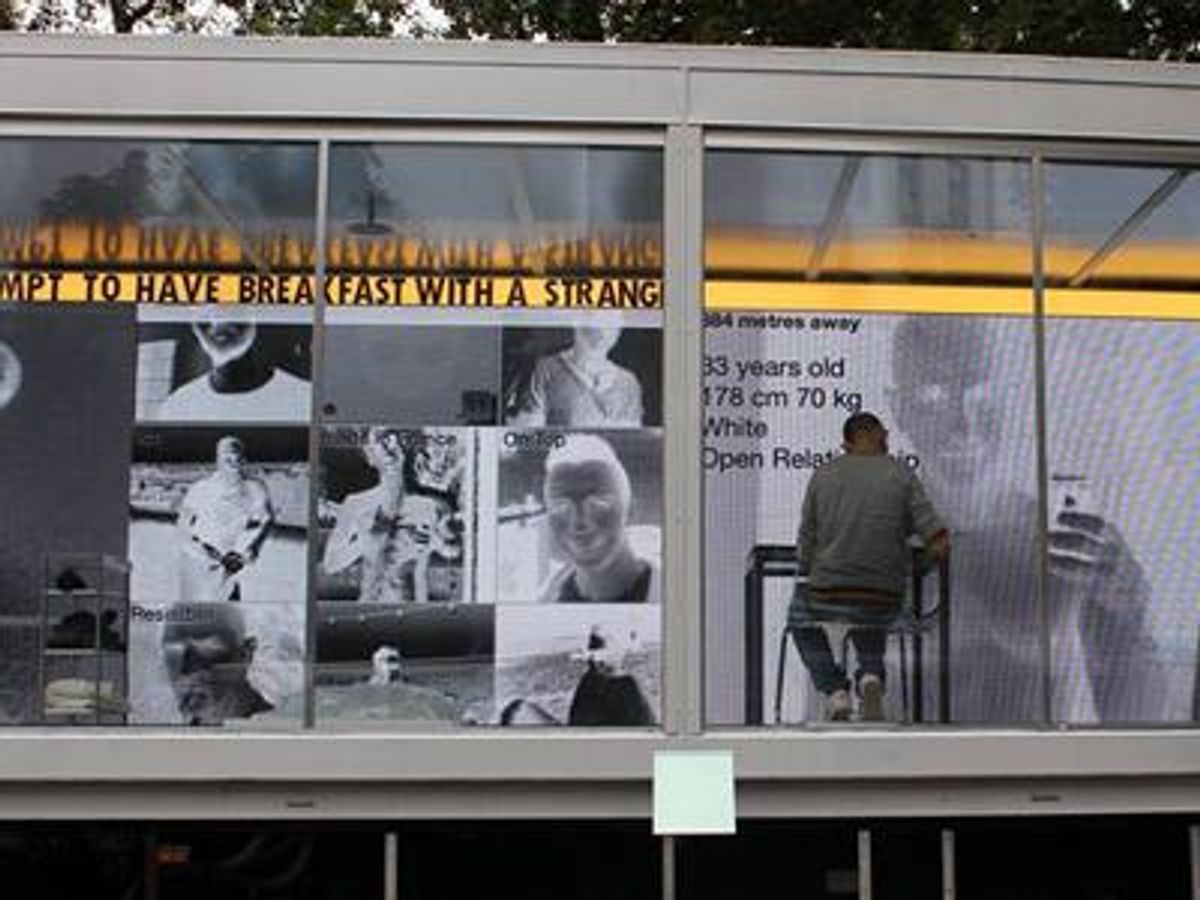
A public art installation in Berlin is projecting Grindr conversations onto a giant screen and has sparked an uproar about what's really private on the mobile dating app.
For the piece -- titled "Wanna Play?" -- artist Dries Verhoeven sits inside a glass case and talks with men on Grindr while simultaneously projecting their interactions onto large screens. The whole thing is also live-streamed online.
The art website Hyperallericcalled the piece a "mistake," with Stephen Truax writing, "When I visited the installation today, there were no projections in the glass container. The artist sat alone, behind a transparent gossamer curtain. He was talking on his cell phone, his back to the audience. A pane of glass had been shattered where one viewer had thrown a rock into it. Perhaps the weight of his mistake has finally set in for Verhoeven."
Verhoeven answered the criticism in a Facebook post that notes none of the men's faces are recognizable because the images are distorted when projected, and that their Grindr nicknames aren't displayed, just the conversations.
"I find it regrettable that people actually feel their privacy has been infringed upon," he wrote. "I find the opposition exemplary in a time in which we, as homosexuals, are once again hiding and choosing to express our sexual feelings in (apparent) anonymity. That anonymity is, I believe, a myth. Everyone who loads Grindr or a comparative app. on their smartphone can see the photos and profiles."
Read his complete response on the following page.
In his own words, the complete response from artist Dries Verhoeven on his Facebook page: It is unfortunate that opposition has arisen surrounding my project "Wanna play?". I find it regrettable that people actually feel their privacy has been infringed upon. I find the opposition exemplary in a time in which we, as homosexuals, are once again hiding and choosing to express our sexual feelings in (apparent) anonymity.
That anonymity is, I believe, a myth. Everyone who loads Grindr or a comparative app. on their smartphone can see the photos and profiles. In the agreement with Grindr uses have to accept that their information will also be viewable without having to be registered (from the agreement: "You acknowledge that some of the Grindr Services may be accessed...without the need to register an account.").
In order not to embarrass the men I make their profile photos unrecognisable using a "rontgen effect". The chat history is displayed without showing a nickname. The chance that men are recognised by someone who had not expected them on the forum is thereby extremely small.
In my work I like to make visible that which is under the surface, in this case the parallel world of the internet, a world where we sometimes feel safer than in the public space. I find it interesting to examine how we function when we consider ourselves invisible.
The importance of the project lies, in my opinion, in openly discussing the future of concepts such as love and commitment when these apps are (or would be) present in our daily lives. I think that the sex-dating app has an obvious influence on the way people, and homosexual men in particular, present themselves and approach each other. I see Grindr, Scruff and other sex-dating apps as symptoms of a time in which our attractiveness has been put on a pedestal and our vulnerability considered suspicious. In the time I myself used the app I noticed it was mainly the hunter in me that rose to the surface. I saw other users as the consumers and competitors of my sexual potential. I have nothing against a free attitude to sex, it is something I have also enjoyed, but I find it concerning if it categorically stands in the way of love. If these types of apps become part of our daily lives I think we will eventually be more concerned with comparing ourselves to each other, trying to impress and judging rather than the apps actually making genuine connections possible. Since flirting is made that much easier it could mean the end of the homosexual nightlife (a new development already underway in cities like Amsterdam and London) and put us back in a new 'closet'. Perhaps not one where we cower behind the norms of the heteronormative world, as we did before the homosexual emancipation of the 70s but, this time, behind a pre-defined, pornographic alter ego. You can find a more comprehensive story about my own experiences with the sex-dating app on www.wannaplayberlin.de.
I am not saying that the latest love technology is purely a negative development. I want us to look for answers together, and see if we can use it differently. Thus I ask the users in the neighbourhood to visit me to satisfy my non-sexual needs and, in that way, start a discussion about the potential of this phenomenon. If men do not want to take part I am fully aware they can block me. I warmly invite people who wish to discuss the project or phenomenon further to visit me in my glass trailer or during the "Coming out", the final evening in the HAU Hebbel theatre on October 15.


Viral post saying Republicans 'have two daddies now' has MAGA hot and bothered